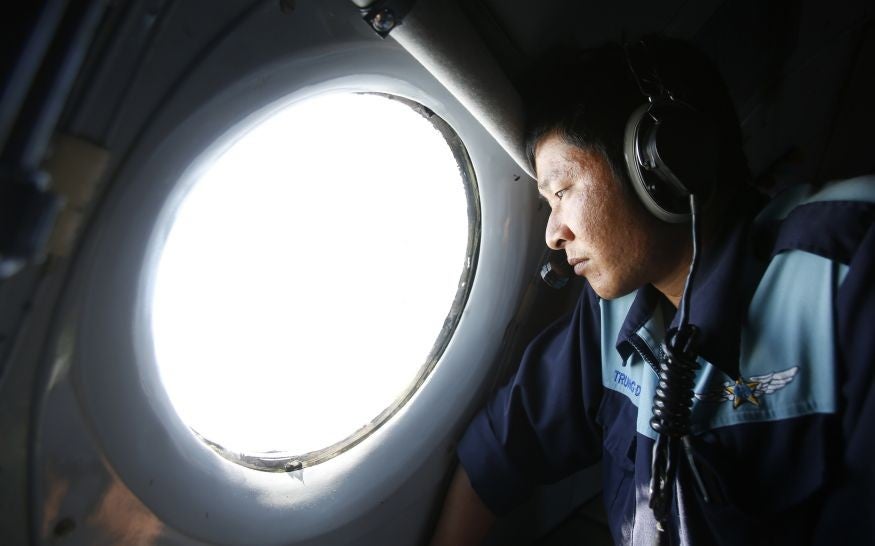Missing Malaysia Airlines Flight MH370: Military radar shows jet could have been 'hijacked' and then flown towards Andaman Islands
Official sources claim military radar data suggests missing flight could have been deliberately flown hundreds of miles off course

Your support helps us to tell the story
From reproductive rights to climate change to Big Tech, The Independent is on the ground when the story is developing. Whether it's investigating the financials of Elon Musk's pro-Trump PAC or producing our latest documentary, 'The A Word', which shines a light on the American women fighting for reproductive rights, we know how important it is to parse out the facts from the messaging.
At such a critical moment in US history, we need reporters on the ground. Your donation allows us to keep sending journalists to speak to both sides of the story.
The Independent is trusted by Americans across the entire political spectrum. And unlike many other quality news outlets, we choose not to lock Americans out of our reporting and analysis with paywalls. We believe quality journalism should be available to everyone, paid for by those who can afford it.
Your support makes all the difference.The missing Malaysia Airlines jetliner could have been deliberately flown hundreds of miles off course towards the Andaman Islands, sources familiar with the investigation have said.
Two sources said an unidentified aircraft, which investigators suspect was missing Flight MH370, appeared to be following a route between navigational waypoints when it was last spotted early on Saturday, north-west of Malaysia.
The last plot on military radar tracking suggests the plane was headed towards India's Andaman Islands, a chain of isles between the Andaman Sea and the Bay of Bengal.
Waypoints are geographic locations calculated using longitude and latitude to help pilots navigate along established air corridors.
This indicates the flight was with being flown by the pilots or by someone with knowledge of the route, the sources say.
A senior Malaysian police official source said inquiries are now increasingly looking at the theory that someone who knew how to fly a plane deliberately diverted the flight hundreds of miles off its scheduled course from Kuala Lumpur to Beijing.
“What we can say is we are looking at sabotage, with hijack still on the cards," the source told Reuters news agency.
Malaysian authorities previously confirmed they were investigating whether any passengers or crew had personal or psychological problems, alongside the possibility of a hijacking, sabotage or mechanical failure.
The three sources said that this new evidence has caused multinational search efforts to be increased in both the Andaman Sea and also the Indian Ocean.
At a press conference on Friday, Malaysia’s Transport Minister, Hishammuddin Hussein said investigators were examining the possibility that the plane’s transponder was deliberately shut down. He also said police were looking into the background of all the passengers and crew.
“There are four or five possibilities which we are exploring. It could have been done intentionally, it could be done under duress, it could have been done because of an explosion,” he said. “That’s why I don’t want to go into the realm of speculation. We are looking at the all the possibilities.”
Meanwhile, VSR Murthy, a senior official with the Indian Coastguard, said Indian assets were now searching not only along the eastern coast of the Andaman and Nicobar islands, but was looking at the islands themselves.
The last sighting of the aircraft on civilian radar screens came just before 1.30 am on Saturday, less than an hour after take-off when the plane was flying as scheduled on Malaysia's east coast, heading towards Beijing.

However, Malaysia's air force chief said on Wednesday that an aircraft that could have been the missing plane was plotted on military radar at 2.15 am, 200 miles (320 km) northwest of Penang Island off Malaysia's west coast.
A fourth source familiar with the investigation told Reuters this position marks the limit of Malaysia's military radar in that region.
If the plane was MH370, had lost contact with air traffic control and was invisible to civilian radar, this could suggest that someone on board had turned off its communication systems, the first two sources added.
They also provided fresh details on the direction in which the unidentified aircraft was heading.
The sources said it was following aviation corridors identified on maps used by pilots as N571 and P628. These are routes taken by commercial planes flying from Southeast Asia to the Middle East or Europe.
The first two sources said MH370's last confirmed position was at 35,000 feet about 90 miles (144 km) off the east coast of Malaysia at 1.21am, heading towards Vietnam, near a navigational waypoint called "Igari".
From there, the plot indicates the plane flew towards a waypoint known as "Gival", south of the Thai island of Phuket, and was last plotted heading northwest towards another waypoint called "Igrex", on route P628.
This would take it over the Andaman Islands, which carriers use to fly towards Europe.
The time was then 2.15 am - the same time given by the air force chief on Wednesday.
Earlier, a US official told The Associated Press that the plane sent signals to a satellite for four hours after it disappeared, raising the possibility the jet could have flown far from the current search areas.
The “pings” sent by the plane provided information about the speed at which it was travelling and its altitude but not its precise location. The last ping was apparently sent when the plane was above water.
If the plane had disintegrated during flight or had suffered some other catastrophic failure, all signals — the pings to the satellite, the data messages and the transponder — would be expected to stop at the same time.
Now, experts are speculating that a pilot or passengers with technical expertise may have switched off the transponder in the hope of flying undetected.
Additional reporting by Reuters
Join our commenting forum
Join thought-provoking conversations, follow other Independent readers and see their replies
Comments